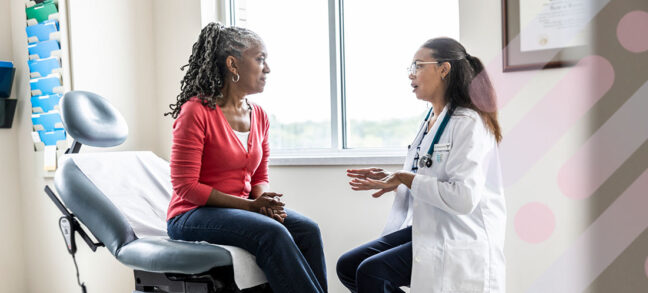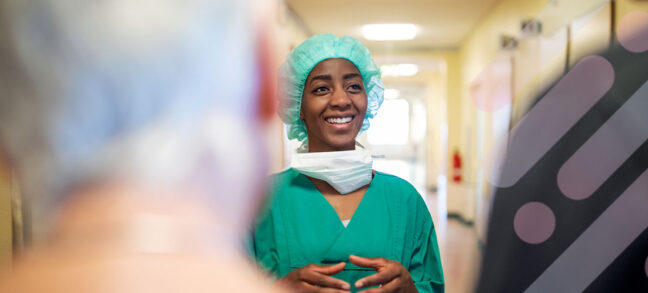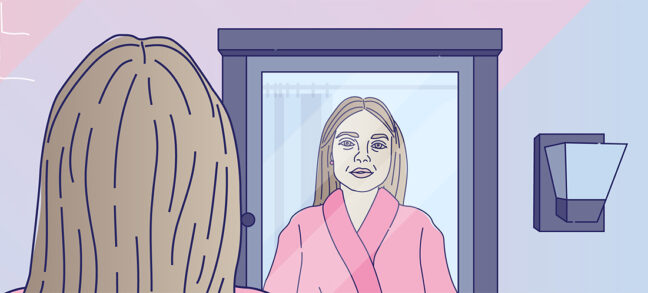Conversations about health complications are always difficult, but when you’re dealing with a diagnosis that has genetic implications, like BRCA, the complexities multiply. In addition to understanding the diagnosis and planning a course of treatment, there’s the matter of telling your family about the diagnosis.1 Who to tell, when to tell them and how much to say all play a role, but you also have to think about how this news impacts the health of your family members as much as it does your own.
Your diagnosis isn’t just yours anymore—it could potentially mean others in your family carry the mutation, as well. In fact, if you’ve been diagnosed with BRCA1 or BRCA2, there’s a 50% chance your siblings and your children have also inherited the mutation.2
This can be an incredible burden to bear, especially if you’re the first one in your family to receive the diagnosis.1 That’s why it’s so important to be thoughtful about how you go into conversations about your diagnosis. Not only for your family’s sake, but for your emotional well-being, as well.3
connect with a genetic counselor
If you haven’t already been working with a genetic counselor to understand your test results, you should consider connecting with one before talking to others in your family about your diagnosis. Genetic counselors are specially trained in helping people navigate the complexities of a BRCA diagnosis and can help you make informed decisions about who to tell and how to tell them.3 They can also arm you with information to pass along to your relatives and prepare you for any questions that may arise.
determine who to tell
Deciding who to tell about your diagnosis is not a simple task. You can’t be entirely sure who is impacted or who would want to know if they are at risk.1 For some, there is also the fear that these conversations will change their family dynamic.1 This is where a genetic counselor can help you understand who may be at risk and who you may want to consider notifying, including:
your parents
Because you inherited the BRCA mutation from your parents, you may want to inform them of your diagnosis. With this information, they can choose whether or not they want to get tested, which could guide future conversations. For instance, if your mother has the BRCA mutation but your father does not, you may decide to communicate your diagnosis with your relatives on your mother’s side of the family.
young children
Young children bring yet another layer of complexity to communicating about your diagnosis.4 While testing and risk-reduction measures aren’t recommended for individuals under the age of 25, some parents still choose to tell their children early on in hopes of fostering healthy behaviors that will help them manage their risk into adulthood.5,6
adult children
Parents often struggle to reconcile their concern around delivering news that could be stressful with the responsibility they feel to protect their children. Though this is a difficult decision to weigh, it’s important to consider that communicating your diagnosis to your adult children is one of the most impactful ways of educating them about their risk.4
extended family
As you move into second-degree relatives like aunts, uncles, nieces and nephews, the chances that you share the same genetic mutation are lower. That being said, they are still at greater risk of cancer than individuals in families without the BRCA mutation, which may inform your decision to tell them or not.7
rely on established channels
Once you have an understanding of who to tell, you’ll need to devise a plan around how to tell them. No two families or relationships are alike, so the approach may look different from family to family and even member to member. Consider how you’ve typically communicated in the past—regular phone calls, email, weekly family dinners—and plan your conversations accordingly. Having a difficult discussion through trusted channels and in environments where everyone is comfortable will help you overcome barriers and communicate openly, ensuring everyone gets the information—and the support—they need.8
prepare a script
As with any difficult conversation, it can be helpful to plan out what you’re going to say. Consider preparing a script to guide you. You’ll likely tailor the script to each conversation—or letter—but having a clear plan for what to say will help you share the difficult news. In writing your script, consider how much each family member knows about BRCA, and be ready to fill in the gaps for them. Be direct, but reassuring, about how your diagnosis could potentially impact them. Finally, offer up any resources you have found helpful as you’ve faced your own diagnosis. This may be in the form of a brochure, website, support group or even a referral to a genetic counselor.
be ready for questions, but don’t expect to have all the answers
As you likely found in your own experience, discovering a family history of BRCA can lead to a lot of questions. You should expect that your family members may have questions of their own. This can be overwhelming when you’re still processing your diagnosis—especially when you’re experiencing the pressure many BRCA carriers feel to have all the answers.3 The reality is no one has all the answers. Address what you can and refer them to additional resources when you aren’t sure what to say.
honor your experiences, and theirs
Every health journey is deeply personal, which can make it difficult to invite someone else in by sharing your diagnosis. Some people may be tempted to weigh in on how you should handle it. Just as you may be tempted to weigh in on what your loved ones should do next. You must allow your family members to deal with the news in their own way. You may bond over the shared experience, or you may struggle to watch them opt out of testing of their own. Whatever happens, it’s important to remember, their experience is their own just as your experience is your own, and you can only do what you believe is right for your own journey.
1J Genet Counsel .2009;18:418-43. doi:10.1007/s10897-009-9232-1 https://onlinelibrary.wiley.com/doi/full/10.1007/s10897-009-9232-1
2 https://www.ncbi.nlm.nih.gov/pmc/articles/PMC4229842/
3 The Oncologist. April 2000;5(2):152-161. doi:10.1634/theoncologist.5-2-152. https://www.apa.org/news/press/releases/2013/05/genetic-testing
4 J Genet Couns. 2013 June 2013;22(3):303-314. Published online 2012 Oct 24. doi:10.1007/s10897-012-9549-z. https://www.ncbi.nlm.nih.gov/pmc/articles/PMC3646977/
5 09 January 2012. https://doi.org/10.1002/cncr.26471. https://onlinelibrary.wiley.com/doi/full/10.1002/cncr.26471
6 Psychooncology. Author manuscript; available in PMC 2015 Aug 13. Published in final edited form as: Psychooncology. 2009 Feb;18(2):200-208. doi:10.1002/pon.1384. https://www.ncbi.nlm.nih.gov/pmc/articles/PMC4535792/
7 Oncologist. 2016 Jul;21(7):869-874. doi:10.1634/theoncologist.2015-0354. Epub 2016 Jun 15. https://www.ncbi.nlm.nih.gov/pubmed/27306910
Resensation Blog

How does mastectomy impact the nerves in the breast?
One sometimes overlooked aspect of mastectomy is its impact on nerves. Read what happens to nerves during mastectomy and explore…
Read More
What happens during implant breast reconstruction with Resensation®?
By repairing sensory nerves, Resensation® enables you to potentially regain sensation to your chest. Read how this procedure works during…
Read More
how resensation® helped Leanna feel secure in her family’s future
With Resensation®, Leanna can be there to watch her kids grow up—without losing the feeling of being whole.
Read More
sensory retraining: what is it, and how can it help me after resensation®?
Sensory retraining is a series of exercises designed to help you reconnect with your body after breast reconstruction with Resensation®.
Read More